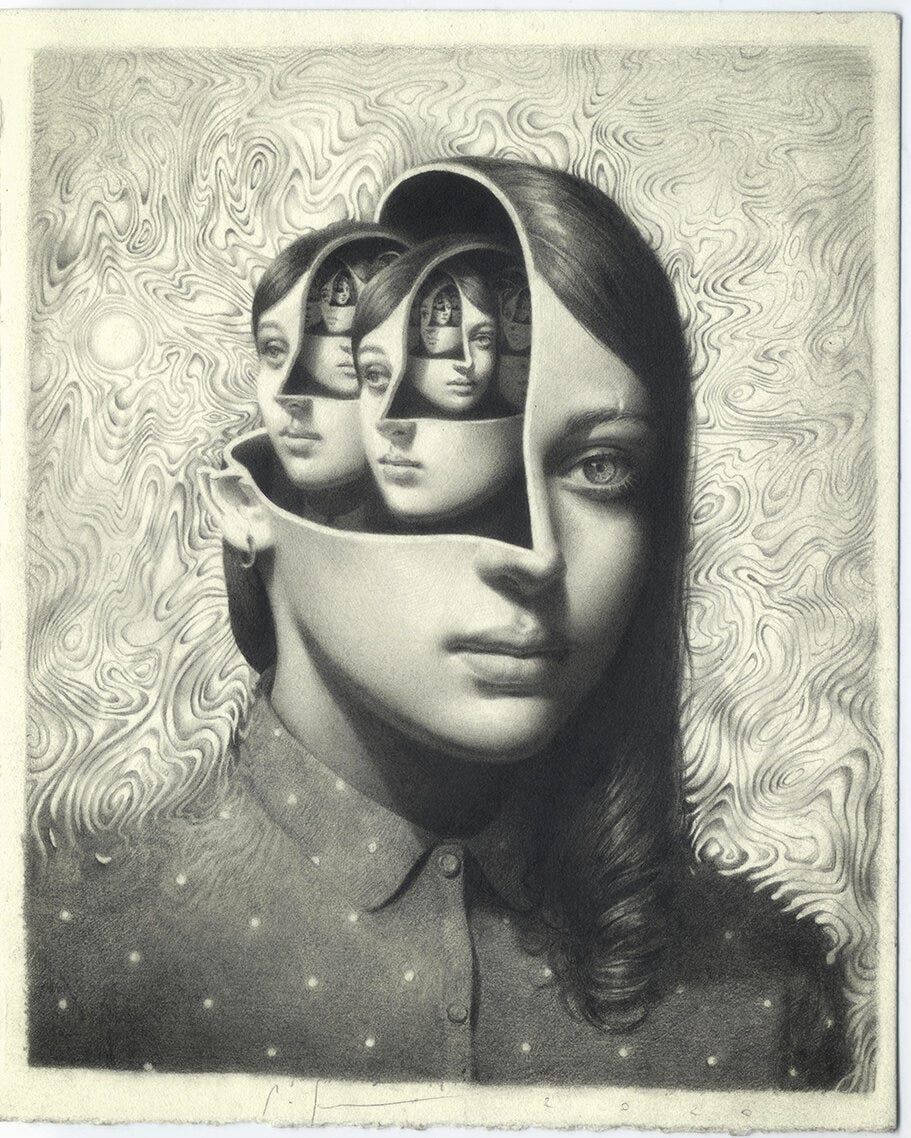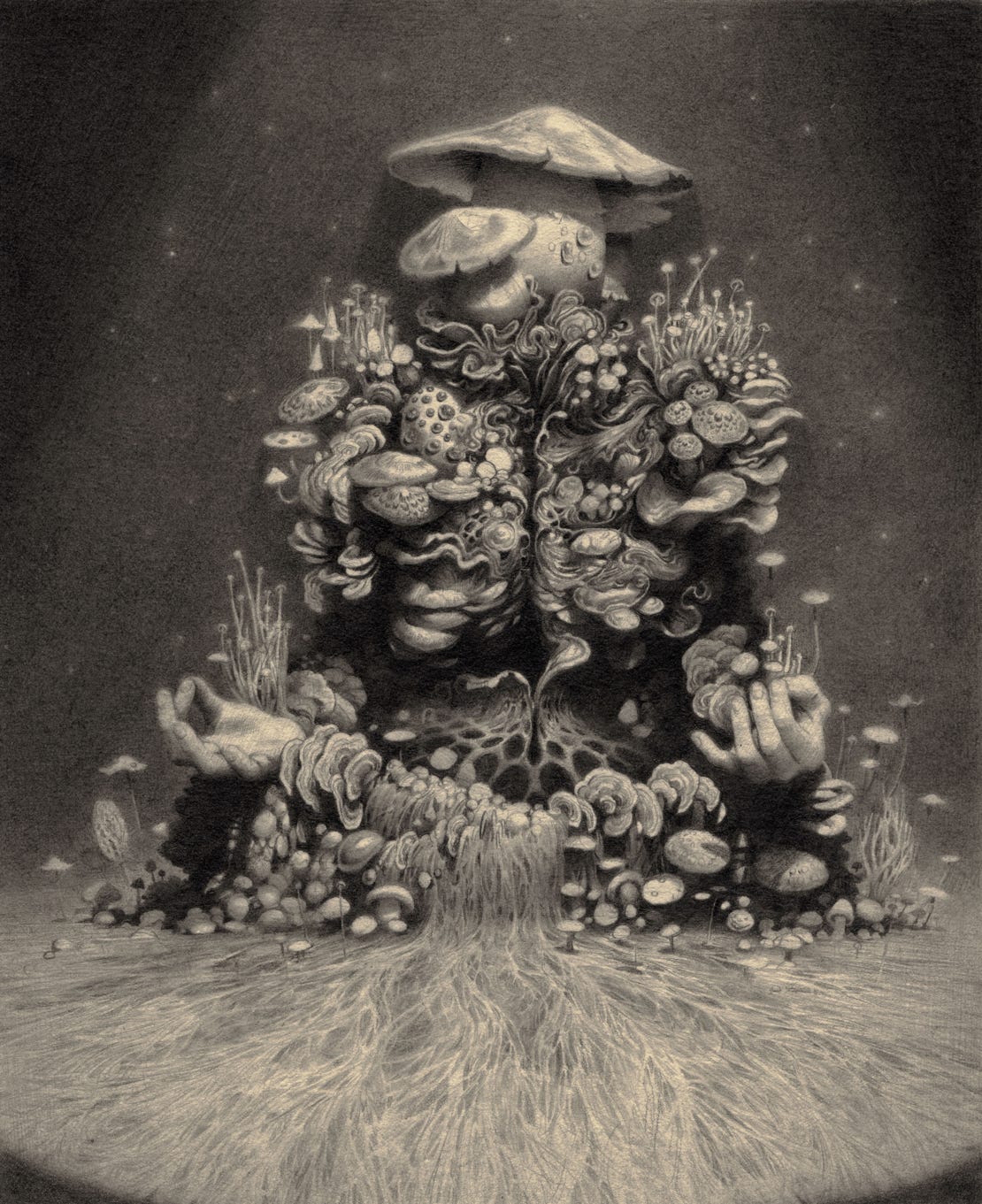Differentiation of Self
How do you differentiate your self from everything else when you have a highly sensitive, subtle self?
I would like to talk about the development of my work from sensitive + thriving to » Sensitive Leadership to » subtle self as a means to talk about what a subtle self is.
In my original work, I was first validating that there are very different needs that sensory processing sensitive folks have with my business of sensitive + thriving. We struggle to thrive not because there is something wrong with sensitivity fundamentally, but when we do not meet our needs and when we are expected to be able to thrive based on someone else’s needs who is not highly sensory processing sensitive. That expectation pathologizes sensitivity. It tells us we can thrive when we are able to control, change, and suppress our sensitivity. When heightened sensory sensitivity is a fundamental part of our genetic makeup and identity, this is oppressive. This causes identity trauma, complex trauma, relational and attachment trauma. It also hurts anyone with a nervous system, not just the those with a nervous system dialed all the way up. We lose total sense of direction when our very identity, our bodies, are seen as the problem. We bury ourselves within many layers and fragments that go deep into our skin. Our skin becomes a mask. And then that is how the problems happen. It is not the sensitivity.
I was offering work that supported sensitive folks in knowing how to meet their needs and showing that thriving happens in our own way, and it can happen when we do it our own way. To help us all come outward to meet our skin and actively live our lives rather than recoil from life. Neurodiversity is real, we are each really physiologically different creatures that function in different ways. This is not just about being nice to people, and this is not about word policing. This is about making actual space and being actually curious about actual differences and what people mean when they talk about what they experience. Just as an orchid has a different nature than a dandelion, so too do we amongst humans. And what is so hard about this is that it is often only subjectively experienced and not measurably amongst us. We can see if an orchid is not thriving if it is limp and brown. We can adjust the lighting or watering or reconfigure needs. When a sensory sensitive person is not thriving, they are often not believed and are blamed or else they find a way to hide or conform. They are not seen. Just like two people could both pick up boxes and both could identify that their boxes are “heavy”, one box might weigh 30 lbs and one box might weigh 150 lbs That’s a difference. It will have a physiologically different effect to carry a 30 lb box vs. a 150 lb box. Just like two people can say “I’m very sensitive” or “I’m in pain” or “I am overwhelmed”, one of them might be highly sensory processing sensitive with a 150 lb box they are holding all day and another might be carrying 30 lbs. But those are the words we have and we can’t so readily compare internal experiences of pressure. And just like if someone breaks a bone when falling down and another gets a bruise in a similar fall, when the one with a broken bone states that they are hurting and need help after a fall, if the one with the bruise says they were hurt too and all the one with a broken bone needs to do is walk it off - they will be doing more damage. We need to believe that we are all having different nervous system experiences rather than assume we are all having the same experience.
As I did this work, I saw the seemingly wild paradox that these folks who were often struggling and very chronically overwhelmed, when they meet their needs, often have an important vision and work to share with the world. Not only could they thrive, they could add immensely to our collective well-being and value. Sensory sensitive folks often do worse when we do not have space to be valued, to be seen, to be attended to in the perspective we offer that often brings about meaningful contributions to whatever field or area of work we are doing. We cannot only lead our lives with sensitivity, we can lead important causes, and we need to. We lead them vulnerably, not manipulatively. That cause could be as a parent, a community member, as an executive at work, and also in small business that does something revolutionary and for a specific subset of beneficiaries. Sensitive Leadership is a process of understanding that wellness, when you sense so much, means having a place to direct what you sense into meaningful outcomes. Sensory sensitive folks are the nervous system of humanity, that turn into canaries in the coal mine when not listened to. They have important information to share that we all can benefit from if we are truly interested in sustainable evolution and not just consumption of resources and capitalizing on whatever we can take advantage of.
Working within Sensitive Leadership, I noticed that as I worked with the entrepreneurs, creators, visionaries who had their work out in the world or their ideas taking shape - they still struggled to serve those they served because of their own sense of self. They would often get to a point of burnout (yoooohooo … I did too!) because even though they were now being valued instead of used or pathologized or invisible to others, they themselves did not have a full sense of self to orient from. They were still primed to interact within their service as they had been trained to and defaulted to from infancy and childhood, within systems that did not attune with them. They truly did not have full access to their centered self and the more valued they were for their work, the more they would run around adapting to the demands of those they wanted to serve who wanted their service without the ability to have strong internal structures and differentiation from their environment. It is great to be valued rather than invalidated, but still overwhelming if it is not connected to your center. And being sensory sensitive as a part of your nature means that you will always be highly affected and will not be able to set boundaries the way that someone who has a sharper, more dense self of self will.
In my training with psychology, human and family development, as a therapist, and anytime I am interacting with the medical system, I take much of what comes to me with suspicion about who the information applies to and how. There has historically been a bias against neurodivergence and a major lack of understanding. So I adapt a lot of what I have learned, to help it work with those who are very sensory sensitive. I studied family therapy and my license to practice therapy is as a couple and family therapist. Systemic work makes the most sense for how I feel I can have an impact with the changes in the health and mental health landscape that I would like to see, and to create the supports I would like to be available.
Bowen Theory in family therapy is quite central to the development of this field of therapy. It sees the family as an emotional unit in which all the members of the family interact and effect one another as a single unit, using systems and cybernetics concepts to describe the complex interactions that can take place within the family. Each family has different rules and boundaries and functioning based on the self empowerment available, to support each individual member of the family in operating more interdependently or more codependently.
I would like you to read a direct quote from The Bowen Center website:
“When family members get anxious, their anxiety can escalate by spreading infectiously among them. As anxiety goes up, the emotional connectedness of family members becomes more stressful than comforting. Eventually, one or more members feel overwhelmed, isolated, or out of control. These members are the people who accommodate the most to reduce tension in others. It is a reciprocal interaction. For example, a person takes too much responsibility for the distress of others in relation to their unrealistic expectations of him, or a person gives up too much control of her thinking and decision-making in relationship to others’ anxiously telling her what to do. The one who does the most accommodating literally ‘absorbs’ the system’s anxiety and thus is the family member most vulnerable to problems such as depression, alcoholism, affairs, or physical illness.”
By all accounts, this describes a sensory processing sensitive person. Yet, there is no mention of a predisposition that might make this person more highly motivated and/or absorbent of all the emotion and anxiety in the family. I would say it is because they are feeling it the most, and maybe they are the only one feeling some of it, that they take on this role. They care the most because they are affected and drained the most by it. So when there may be both an inborn haziness to your own recognition of “that is not me and this is me” with a very permeable nervous system that is highly affected by input and struggles with sifting though all the interoception and proprioception — ESPECIALLY if there is no help with this from parents or adults in a highly sensory sensitive child’s family, and then also a systemic dynamic reinforcing the use of your very permeable and affected body and self to be a shock absorber, it can be very difficult (impossible?!) to know how to support oneself in setting boundaries.
In regard to differentiation of self, The Bowen Center states:
“The less developed a person’s ‘self,’ the more impact others have on his functioning and the more he tries to control, actively or passively, the functioning of others. The basic building blocks of a ‘self’ are inborn, but an individual’s family relationships during childhood and adolescence primarily determine how much ‘self’ he develops. Once established, the level of ‘self’ rarely changes unless a person makes a structured, long-term effort to change it.”
We can look also at bipolar tendencies, borderline tendencies, schizoid tendencies, substance dependence, eating disordered behavior, obsessive and compulsive behavior and tendencies, attentional and executive functioning challenges, impulse management challenges, emotional intensity, psychosis, chronic autoimmune and physiological differences in pain, and so many other neurodivergent tendencies and behaviors and ask ourselves how much of this comes from being sensory sensitive alone and how much comes from being sensory sensitive in a world that denies your lived daily experience and cannot or will not attune with you to help you function as you? I see so many sensory sensitive people needing to be seen and have any kind of influence and power in their lives who get identified only as codependent. I see so many of us doing beautiful work that is also oriented from a place of needing to change the world or change our childhood experiences, waiting to experience enough and be satisfied but it never comes because we do not have a sense of what is enough that is centered in us.
One interesting game that I play with A.I. and Chat GPT is asking “what’s the difference between autism and schizophrenia?” Or “what’s the difference between ADHD and bipolar disorder?” “What’s the difference between an eating disorder and OCD?” Maybe this is a game only a neurodivergent therapist would play, but it is quite intriguing for me to get the response that the A.I. cannot find a major difference yet it insists there is a difference because they are two distinct labels and so there must be a difference, and it recommends to consult a medical professional. I have seen many medical professionals get all of these diagnoses confused. And I have seen many individuals that display all the symptoms of all. I am also not saying there is no value to these labels.
I would suspect that there are deeper layers to what we are trying to identify here. I understand that science needs to narrow down symptoms in order to study them. I personally just feel that we could narrow symptoms in a less capitalistic, oppressive way. A single tree can have many branches, and if we only focus on what is happening at the end of the branches and see the branches as separate from the tree, that seems to be a part of the problem - if not the whole problem.
I always find it interesting when experts in OCD, ADHD, autism, borderline and many specified diagnostics explain that it is the OCD or ADHD or autism or borderline that causes the heightened sensory sensitivity, and not the other way around. Did you know that autism used to only be a feature of schizophrenia? And we used to say, some people still say, that males are more likely to have both autism and ADHD than females. Those identified as boys certainly get diagnosed more in childhood with these than those identified as girls. There is now an identified correlation with neurodivergence and queerness regarding gender and sexuality. Some of us may experience one diagnosis more prominently than another. However, with many humans that I work with and with myself, we could have all these diagnoses and I don’t think trying to treat the diagnosis singularly has been helpful because it misses the point that we are alive as sensory sensitive humans to live our lives, not to conform just to survive.
Our nervous systems are central to our existence, they are not parts of a machine that might malfunction. This work that I offer is about starting with the sensitive, subtle self as the trunk of the tree. There are many branches that come off of that tree. And I personally think it is totally fair to use any resources that support you in whatever branch or branches of the tree you may identify with. AS LONG AS there is first and foremost support for you to attune with you in order to make that decision rather than coercion through power systems that confuse and disorient you into believing or experiencing that you will finally have more social acceptability and power if you follow their protocol. Treatment as conformity is totally different than treatment as support.
When does someone get to be attuned with? When do they get to be believed? When is their perspective important to how they are treated? And when does someone else’s perspective matter more than the subjectivity of an individual to make decisions for that individual’s life? And especially when someone has NEVER had any support or chance to be attuned with and so they of course develop harmful behaviors and symptoms because they are not able to center in themself to meet their needs because they do not have their own sense of self to orient to life with? And then they get sent to a hospital or treatment center or jail or the street or live in isolation or are able to somehow mask all of this which means they CANNOT control or direct any element of their life…when could we ever discover this missing link of lack of self orientation to a very sensory sensitive self that has a very different self orientation than someone who is not so sensory sensitive by nature? And when do they ever get a chance to develop it? I always hope that anyone offering care knows at least as much as I do, and hopefully much more, about the symptoms and systems they are stating and intending to address related to my body and my needs. I am happy to have someone offer expertise and for them to know more than I do, and they need to show me that they can in fact offer expertise by actually holding space for my actual experience and expecting that my subjective understanding matters to the whole process. We should not have to turn over our subjectivity in exchange for care. That is not care. That is being taken as a hostage. Sometimes it turns into blackmail because of how our social systems work to pathologize certain identities.
Through working with what is diagnosed as dissociative identity disorder (DID) with the amazing humans I get to work 1-1 with, I have gotten to see better the ways in which many of us fragment. Internal Family Systems (IFS) and the many iterations of internal parts work are being talked about more publicly. I hope that we as humans are becoming more aware of how political we are within our own bodies. How our individual survival creates internal systems of power that can be so tricky to stay present with. We split before we have any knowing. We split before we could possibly be responsible for it, and yet it creates so many ripples out from there that we must become responsible for somehow in our adulthood. We could not have done anything differently than what we did do before we knew what we were doing and so we must forgive ourselves for being vulnerable, totally dependent, and not having all power. That is how we can use our power now. When I say forgive, I mean let go of what we are holding against ourselves for survival. Enter the abyss of the acceptance of our powerlessness so that we may actually experience our power. What we can actually do may be different than what we think we can.
I find that sensory sensitive folks have a greater ability and tendency to dissociate, so much so that I want a different term or at least clarification. There is more research now to show some genetic predisposition for those with dissociative disorders. Some people think that the answer to dissociation is to somehow stay or be more in one state of attention or awareness more of the time or all of the time. My sense of this is that I think a lot of sensory sensitive folks (maybe all?) need to separate sensory input out so that they can direct themselves in the ways they want to. When I am driving, I certainly go into a different state than I do when I am chatting and I will miss my exit if I start chatting or if there are just two too many things happening at the same time. My brain cannot do it. I know I am blocking things out and splitting off from information that does not pertain to keeping my car as safely in my lane as possible. Oof I was not prepared to have toddler questions randomly thrown at me from the back seat right in the middle of Manhattan traffic. But we made it. I find it is generally more functional and less harmful to know you are doing this than to not know it. I am speaking generally, and everyone’s unique life circumstances are different. I think about association in terms of levels and I think all of the 8 levels of the Holarchy of Needs are different levels of reality with different levels of tangibility and functionality. So learning which level you’re operating at can be helpful. Like the transcendent level and working with what is imaginal is different than working with what is physiologically present at more of an actual level.
For all the splits within us and different identities, many of them will be here for our whole lives. Often, it is more functional to help them all work together and be equally aware of and responsible collectively for behavior. Otherwise, a split aspect or identity could be in charge of body behavior that other aspects may not know about or may only know part of and can be very disoriented by trying to make sense of all the circumstances one’s body ends up in. Being able to track behavior across states can be very helpful, albeit sometimes very challenging depending on trauma and sensory needs. Being able to do this, especially when there is a high level of childhood trauma (especially sexual trauma), means being able to tolerate incredible levels of pain, discomfort, and powerlessness. Being able to do this when there is a high level of executive functioning challenge or dysfunction takes a lot of tools, a lot of reminders. Sometimes life circumstances force one into knowing how split they are. Often, this is when I meet with somebody as a therapist. It is because something happened in their life that revealed their coping strategies to them which are causing some kind of harm and they now see how much they cannot tolerate their own life. They have lost their mask.
Losing one’s mask and one’s strategies for coping with life can be incredibly disorienting. Going back to splitting when things have come together unintentionally can be a very strong urge, even when it is no longer really fully possible. And for a time, it is common to lose all sense of face. All sense of intentional presentation. Losing touch with life around you can become psychosis, but can also be an intentional absence to see what emerges from inside when supported over time. Believing oneself when you have enough internal and external resources to support oneself means letting go of being someone for external expectations or safety through controlling or managing the environmental perceptions of you. Even when psychosis happens, there can be a way through to a self orientation that accounts for sensory sensitivity and meeting needs in new ways. Despair often shows up here and it is hard to hold, so it definitely helps to have someone hold it with you or for you at times in a facilitated way (like maybe therapy).
I marvel at the ways in which psychedelics and psilocybin mushrooms do this with us, for us, as us, in us. I don’t know what the verb to use here is. They are connective teachers that work with connective tissues. They connect what was split and separated. Our consciousness must learn to track and work with this connection, and I believe it can and it will. Different substances interact with different bodies differently, of course. And so I am not prescribing anything in any generalized sort of way. I am saying unequivocally, for myself and others I have witnessed, psychedelics have been essential to the level of healing some of us experience. As a therapist, I do my best and I have learned some incredible things. There are ever advancing technologies and models and ideas that are profound and I value my work in my therapy and as a therapist. I cannot do, nor can anyone else do, what psychedelics have. The set and setting matters. The preparation matters. The intention matters. The integration matters. The trajectory matters. The on-going support matters. Probably using psychedelics once is not what will do it, but it can be an opening. Doing them at a party or when distracted or unsupported and afraid, is not what I am talking about. I am talking about a deep dive while at rest in a safe space with the intent to be with what shows up. Progressively. I will share more about this later.
I have some suggestions on what we can do that are not only psychedelics. I am not just complaining. I am advocating deeply for a way of working with our selves and each other that changes the way we use sensitivity, individually and collectively. I have a diagram below that is very simple in appearance and has much it can explain. And it is also totally fair for you to apply my complaints above to what I am offering below. I do not want you to hand over all your power to me. I want you to feel in you what I am talking about and see how it lands for you, if you have questions, feedback, or if this is not something you want. That is all fair. No one else can center in you for you. It is a skill and it is your own conscious orientation within your sense of self.
I have developed practices that I have put on cards, that you can get here, that walk one through the development of internal structures that support in leading with sensitivity. This image is a part of and a distillation of some of those practices. And I would like to walk you through it now. However, no amount of describing it will equal even one minute of experiencing it personally. I will describe it and I hope you might also be open to experiencing it. And there will be more experiences to be had with it.
red circle :: this is representative of one’s whole self, the dividing line between what I am accessing and what I am not accessing with my senses
green lines with arrows :: these are representative of internal forces being directed intentionally inward and outward at the same time creating space and flexible internal structure, like tent poles
assertion :: this correlates with anger, defense, and can become rage under certain extremely violating circumstances or resentment under invalidating circumstances, it is the force that moves up and out of us to maintain space that we need in order to survive when we are violated in large and small ways
caution :: this correlates with fear, protection, and can become terror under certain extremely threatening circumstances, it is the force that moves down and in to hide or freeze or immobilize or remove ourselves from circumstances that threaten us
compassion :: this correlates with empathy and our awareness of connection to others as a part of who we are, it starts with full dependence and can evolve into interdependence, codependence, independence or some variation and it has a motive of encompassing or passing around
passion :: this correlates with a motive toward self enjoyment, expression, creativity, pleasure, and individuality, to simply pass through the world in the directions that call to you
Within all of these there is an element of what helps us center in our selves. Bringing this energy inward to where each of them meets, creates a supportive center from which to connect outward with all of life. All of these have important information for your self and for survival and thriving and leading, as well as simply existing as one is. Your focus needs to be on the center when the outer line or boundary is much less controllable or clear. What gets in, when, and how is not always predictable. But you can continuously come back to your center, in whatever way you can and as soon as you can.
Many sensory sensitive people can become lopsided or de-centered in their own existence. For instance, I see many of us primarily utilizing compassion and caution and directing passion and assertion toward that bottom left quadrant as well so that there is no center and all energy goes around the circle and down, very heavy and very much running in circles to try to meet all the demands of everything connected to the exterior of the circle to avoid conflict out of fear of discomfort. Remember, everything is connected to the circle because of the circle, because the circle exists. The circle does not exist only for and because of everything else. Everything else brought this circle to being. As it’s own being, through all other being.
I see others using primarily passion and assertion while directing their compassion and caution toward that top right quadrant in a way that exploits others and ignores or avoids the harm to others that is coming from directing caution toward passion and assertion only. There are many iterations of how this can look. We are aiming for a sturdy center that reinforces moving this energy in an internally oriented structure which connects you to all of life. We do not want to use you up with all that comes at you and because others in your life did not help you find your center.
I am going to say this simply and I want you to listen, really listen. That circle is you, I promise you if you are reading this you are a circle. So you get to manage what is in that circle and how it works together. No one else can. And you will have limits on what that management means. You do not get to choose what has already come into that circle or how it got there, or even what else might come in. But you do get to channel, direct it, work with it in your own way based on your abilities. And you get to develop your own center that you orient to. This is your power. When you set up these lines, these structures, they become nets interconnecting you with others in ways that go beyond words. When you can hold your caution, your assertion, your compassion, and your passion together and help them connect and BELIEVE in the information here in the middle of you, you are taking good care of you. I believe in you. I believe you are really here and you really have your own knowing about your limits, needs, wants, and desires and you can live by them. When you do this, the things that are for you can come to you.
For today, I encourage you to think about ::
What are your limits? Believe them. A limit is any restriction on what you have access to. Working within your limits helps you sustainably move in directions you want to. Some people hear the word “limit” and miss the point, they think I am talking about not doing things. Limits help us do the things, when we know what they are and we work with them. There are physical health and physical ability limits, there are internal and external resource limits, there are support limits, there are time limits, there are many different ways our access can be restricted and we need to respect that.
What are your needs? Believe them. A need is anything that allows life to continue in the direction it is moving in. Meeting your needs gives you the juice to be alive. Meeting your needs is your most important job. A need can be for space, to eat or not eat certain foods, to have your emotions held with you, to move your body, to breathe deeply, to rest, and so many more things. A need does not specify a particular “how”. And even if we are not sure how to meet a need, it is still a need. You can be in the middle of the desert without water and still very much need water. Just because it is not there does not mean it is not a valid need. How you might go about trying to meet a need for water in the desert will be very different than in a house with plumbing. If you are not sure what your needs are, you can try asking “what would satiate or satisfy me right now?” Compulsive and harmful behavior that leads to acting on an obsession is not what I am talking about. Needs will get met one way or another, so even when we do not meet them they will be met and sometimes compulsively and with whatever we have at hand. I am not talking about what gets rid of all discomfort or what only feels comfortable (or numb). I am also not suggesting blame or shame for having met your needs subconsciously in whatever way you could. I am talking about what could bring about some supportive satisfaction for your body and your existence as you can now as a strong act of forgiveness and responsibility for existing and taking up your space. Taking a pause or being entertained and distracted is sometimes a need. Sometimes there is grief when you meet an unmet need for the first time. It is sometimes uncomfortable in some way to satisfy a need.
What are your desires? Believe them. A desire is a feeling of attraction toward an idea or image, feeling drawn to it. Desire often leads to fantasy, which is a totally helpful experience as long as you do not use fantasy against your actual physicality. That can be hurtful. A fantasy can show you what you are desiring when you let yourself embellish your fantasy and get clear on the feeling there. Even scary fantasies are the flip side of a euphoric fantasy. No is the other side of yes, so imagining your way through that can help you. If you know what you do not want, you can guess at what the opposite is. You may be desiring a vacation, a change of schedule, new connections, to express yourself in a new way, and many more ideas or images you may feel drawn to. Once you know the feeling you are desiring you can then work with your limits and needs to do what you want.
What are your wants? Believe them. A want is something we choose from options currently, presently available to us. We want based on what we have access to. If I am at a restaurant and I have a desire for gluten-free pasta, I may look at the menu to see if that is an option. If it is not on the menu then that is a limit, it is not something I can want. There may be only three gluten-free items on the menu (I am gluten-intolerant, a limit for me) which might be a salad, fish, and curry with rice. So I can decide what I want from those three items, or I can also decide to leave the restaurant and look elsewhere. Those are all things I currently have access to in that situation. I need to eat nourishing food, but how I do that is based on my limits and desires and wants. Wants come from working with those limits and desires and needs. The more we can guess about these things, make decisions to want things we have access to, the more we strengthen our self-directedness. This is how we get centered. The more you do it, the stronger those internal structures are and the easier it gets. Guess away. Guess all day. Guesses are how we get feedback to make the next guess a little bit closer to center.
I am sorry if you have had no one in your life encouraging you to make guesses based on your internal experience of your subjectivity so that you could strengthen your sense of self. So that you could believe your self. I am sorry if you have had many people (maybe everyone?!) denying the reality of your real sensory processing sensitive subjective needs, limits, desires, and wants. Truly, I feel deep sadness about this. And I feel with you on the heaviness of this. Your needs, limits, desires, and wants will be based on your nature, your nervous system, your body, your circumstances, your context, your experiences, your development. They can and will change. And you can and will grow and strengthen your center as you practice these things. I’m here for it.
And if you want the cards that are the basis for these practices this year to physically hold and work with in your hands, now is the time to get them »»» RIGHT HERE. They will only possibly be available until December 22nd. At least for this year.
Starting in January 2024, we will be working through specific practices from all that I have learned about how to support those with a subtle self to experience their own existence as theirs and strengthen their center. I hope you will join in when and how you can. My intent is to make this work as accessible for all who want it as possible - so there will be many ways to participate depending on your needs, limits, wants, and desires. And we all benefit the more that more of us come together and share from our center.
From my center to yours, thanks for being here. I hope we can be even more here.
All of the art in this post was made by Miles Johnston and each image links you to the art on the artist’s website. My kid told me my last post did not have enough images. If you have art you would like me to feature in a future post, let me know. I am always happy to share the work of sensitive folks with permission and credit to the artist.

















